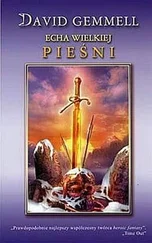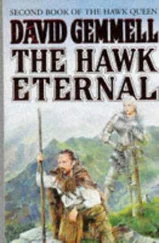'Yes, do that,' said Bane.
The boy ran off and came back moments later leading three horses, which he tethered inside the circle. 'The rest ran off,' he said. Axis moved past the fire, gathering the reins of the king's white gelding, bringing that also close to the fire. Then he searched the saddlebags of the other mounts, coming up with several thick slices of ham, wrapped in muslin. He offered some to Bane, and the two sat in silence as they ate. Time passed slowly. The boy Axis fell asleep by the fire and Bane found himself thinking of the past, of his hatred for Connavar, of his yearning to be accepted and acknowledged. He had lived so long dreaming of the day he would kill this man whose hand he now held.
The king groaned again. Bane looked at his face, and saw his eyes were open. But they were not focused on him. 'Ah, Wing,' he said, 'don't look so sad. Everything will be all right.'
'Connavar!' said Bane, squeezing the king's fingers. Connavar blinked then looked at Bane.
'He came back,' he said. 'He is waiting for me.'
Bane said nothing, for there was nothing to say.
'Put… my sword… in my hands,' said Connavar, his voice fading. The blade was leaning against the stone behind the king. Bane lifted it, placing the hilt within reach. Connavar did not move. Carefully Bane opened his fingers, pressing them closed round the fabled hilt. The dying man gave a last sigh, then his head sagged, his body sliding into Bane's arms. For a little while Bane sat holding the king, feeling the weight of Connavar's head against his shoulder. Then he laid the body down.
Riamfada walked into the stone circle and knelt beside the body, leaning over and kissing the brow. He turned to Bane. 'I thank you for being with him,' he said.
'Why didn't you tell me about Braefar? I could have stopped him.'
'I did not know exactly how it would happen, Bane, only that it would happen.'
'I'd like to find him and kill him myself,' said Bane.
'There is no need. Braefar is dead. He ran into the woods, and slashed his own throat with the dagger that killed Connavar. Now he and his brother are together, and all the ill feeling is gone.'
'Then it was Braefar the king saw as he was dying?'
'Aye, it was.'
Bane rose.
'Have you made your choice?' asked Riamfada.
'I have – as I think you knew I would.'
'Of course,' said Riamfada. 'You are the son of Connavar, and I would expect no less.'
In the faint light of the pre-dawn, as the breakfast trumpet sounded, Jasaray awoke from a light sleep. For the first time in years he had suffered bad dreams. He had been walking towards a torchlit parade being held in his honour. As the crowds cheered he saw a shadow above him, and realized it was a falcon, flying through the night sky. He looked up, wondering what would force a sunlight bird of prey to take to the skies in darkness. Then it swooped down towards him, its talons rending at his face.
Jasaray shivered at the memory. He had a slight ache in his back and groaned as he sat up. It had been some years since he had embarked on a campaign and at sixty-five his body was complaining bitterly. His joints had throbbed since arriving at Accia during a thunderstorm, and his mood was sour.
Outside the command tent he could hear men moving about their chores, the stripping down of tents, ready to be rolled and packed, the gathering at food queues for the bowl of hot meat broth and the hunk of bread, the rattling of harnesses, the banter of fighting men who knew that a battle loomed. These were sounds Jasaray had come to love with a passion that had always been missing from every other aspect of his life. He had hoped that the campaign against the Rigante and their allies would lift his spirits, and resurrect the joy of his youth, but that hope seemed doomed now. There was no way that the coming victory would really satisfy either the people of Stone or indeed himself. The citizens were used to victories by Jasaray and his Panthers against overwhelming odds. Invincible Jasaray!
The emperor sighed. Who would have imagined thirty-seven years ago that the spindly lecturer in mathematics would become the greatest military genius of the age? Certainly not the man himself, thought Jasaray, with a wry smile.
The twenty-eight-year-old whose co-ordination was so bad he had never mastered either swordplay or the throwing of spears, who had never attended the military academy, found that his first rank within the army was that of a general. It had been wonderfully bizarre. The civil war was at its height, and the biggest problem facing those trying to save the republic concerned logistics and supply – food for the army, wagons, horses, weapons. In short the Third Army of the Republic, under Sobius, needed a qualified quartermaster. In order for him to negotiate at the highest level Sobius had made Jasaray a general. He had, as they hoped, proved a brilliant quartermaster, and the Third Army was never short of equipment or food. What they were short of, however, was intelligent leadership, which led to the army's being routed by the rebels. In the space of three short days, with Sobius and his staff dead, Jasaray was the only general who could take the field.
And he had, fighting a stunning rearguard action, using tactics no-one had ever encountered, marshalling his troops with a precision previously unheard of. Thus the man known with affectionate contempt as the Scholar won the war and saved the republic.
Within the next few years the increasingly powerful Jasaray wrote three Manuals of Combat which changed the face of war. His armies were well armed, well fed, and superbly disciplined, exchanging personal heroism for unit cohesion, brute strength for tactical brilliance. No Stone army under Jasaray had ever tasted defeat. In fact the only stain on the military history of Stone had come at the hands of Connavar when the idiot Valanus had marched a pitifully small force deep into Rigante territory and been massacred.
Now that reverse was to be expunged from memory by a crushing victory. Yet there would be little joy in it. Jasaray had hoped Connavar would be able to gather an army of at least a hundred thousand. Instead reports suggested less than fifty thousand opposed him.
What a waste of time and energy, thought Jasaray, rising from his bed and pouring himself a goblet of water. He should have sent Barus to subdue the tribes. And he would have done just that – save for the unrelenting and increasing boredom he had suffered since becoming emperor. He could have blessed Nalademus for his treachery, which, at least, had provided a spark of excitement. The truth remained that the only real pleasure still to be had was on the battlefield, and Stone was running out of worthwhile enemies. Jasaray could have invaded the Rigante many times over the years. But he had reserved Connavar as a special treat, the last great opponent in an increasingly dull world.
Jasaray had followed his career with interest, remembering the young Keltoi who had served under him in the battles against the Perdii. A fine young man, brave and intelligent, and yet with the mental strength to curb the wild, reckless excesses of his Keltoi nature. Today's battle – though its outcome was certain – would not be an easy one. And there would be no glory in it. Back in Stone they would hear of his victory and shrug. 'Ah well,' they would say, 'it was only a few tribesmen.'
The tent flap opened and one of his guards looked inside. Seeing the emperor awake he called out, 'The scouts are back, lord.'
'Send them in.'
Two Cenii scouts entered the tent, accompanied by the guards, who watched them warily. Both the Keltoi were rough-looking men, sour-faced and surly. 'Well?' asked Jasaray.
'The Rigante are forming with their backs to the river,' said the first. 'They are manning a line of hills around a mile north of here.'
Читать дальше












